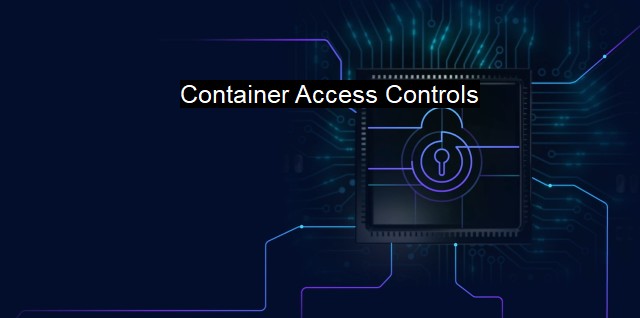What are Container Access Controls?
Securing Containerized Environments with Container Access Controls and Antivirus Technology
Container Access Controls refer to the management and regulation of user activity in containerized applications. To understand this fully, one must first comprehend what "containers" in the cyber security context means. A container is a lightweight and standalone application that includes everything needed to run the said application such as the system tools, runtime, settings, and libraries. Containers encapsulate the operation elements from the user, plus are standard, meaning they can operate consistently across different environments. containers offer a convenient method for packaging and running applications. But like all systems, they are vulnerable to cyber threats.That's where Container Access Controls come in. They are vital for regulating and tracking user behavior, ensuring that users only access what they need to and avoid facing potential risk scenarios. It aligns with the principle of least privilege (PoLP), a concept in computer security where a user gets minimum levels of access necessary to complete his tasks.
Container Access Controls involve setting rules or policies to manage user access and track the user operations in the container applications. For instance, if you have a database container running an application, using access controls would restrict individuals from accessing this container unless they have explicit permission. access control mechanisms can stop unauthorized information disclosure, modification, or denial of service by ensuring only those with defined rights can access certain services or data.
Implementing Container Access Controls can help organizations identify cyber threats earlier by closely monitoring container activity. When a user engages in unrecognized or malicious behavior, the system triggers a warning, allowing for rapid response. This mechanism enables businesses to not just identify threats, but also predict them by analyzing patterns of behavior.
It's important to also understand role-based access control (RBAC) in containers. RBAC enables the restrictions of network access based on the roles of the network's individual users within a business. Implementing RBAC adds an additional layer of access control, as even among authorized users, access can be restricted based on their roles in the business.
It’s equally crucial to employ third-party security solutions alongside these set controls. Numerous tools exist that scan container images to detect and isolate potential threats, much like antiviral software for standard computer systems. These measures comb through applications for any vulnerabilities and work together with Container Access Controls to create a robust defense system against cyber threats.
Container Access Controls require regular audits to ensure optimal performance and to update or build upon existing controls to fill any security gaps. Regular health checks of container environments and routinely reviewing the control configurations will increase the efficiency of the system.
To summarize, Container Access Controls are an integral part of the cybersecurity infrastructure. They provide an extra line of defense against unauthorized or malicious activities within your containerized applications. By establishing stringent Container Access Controls and combining it with effective anti-malware measures, businesses can ensure data security and business continuity. this requires constant threats calibration, battle-testing, and updates to stay ahead of potential security risks and vulnerabilities. The reward outweighs the effort required: a more secure, efficient, and compliant operational environment. All in all, Container Access Controls are essential for the cybersecurity of any organization utilizing container technology in their operations.

Container Access Controls FAQs
What are container access controls?
Container access controls refer to measures implemented in cybersecurity and antivirus tools to regulate access to software containers.Why are container access controls important in cybersecurity?
Container access controls are important in cybersecurity because they enable organizations to prevent unauthorized access to containers and reduce the risk of malware attacks.What are some common container access control methods?
Some common container access control methods include user authentication, role-based access control, and network segmentation.How do container access controls improve antivirus protection?
Container access controls improve antivirus protection by limiting the exposure of containers to risky environments and detecting malicious activity at the container level. They also enable antivirus tools to quarantine and remediate security threats more quickly and efficiently.| | A | | | B | | | C | | | D | | | E | | | F | | | G | | | H | | | I | | | J | | | K | | | L | | | M | |
| | N | | | O | | | P | | | Q | | | R | | | S | | | T | | | U | | | V | | | W | | | X | | | Y | | | Z | |
| | 1 | | | 2 | | | 3 | | | 4 | | | 7 | | | 8 | | |||||||